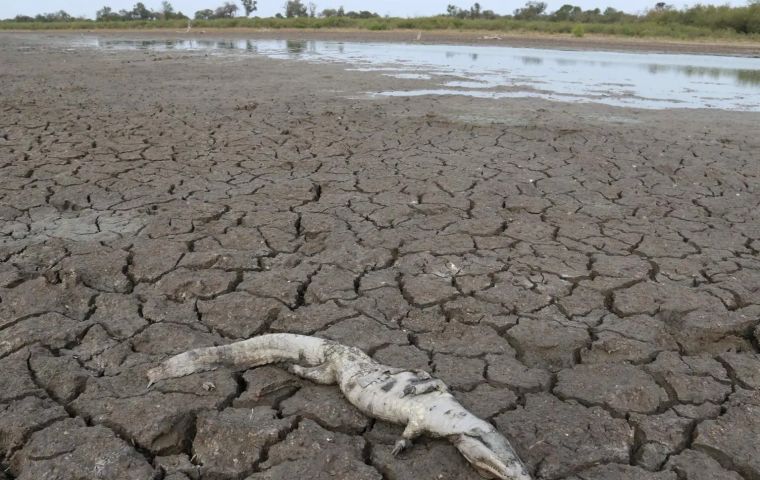MercoPress. South Atlantic News Agency
Drought hitting Chaco region concerns Paraguayan authorities
 Peña said on social media that action would be taken “so that the long-awaited aqueduct becomes a reality”
Peña said on social media that action would be taken “so that the long-awaited aqueduct becomes a reality” Paraguayan authorities expressed their concern Thursday given the dramatic drought causing social, economic, and environmental devastation in the region of Chaco, which is also affecting parts of neighboring Bolivia, it was reported.
According to local media, thousands are without drinking water, while a mega-investment of US$ 130 million in an aqueduct turned out to be a fiasco. Public Works Deputy Minister Aristides Espinoza said the work completed by the previous administration was a failure. “The pipes should be of uniform diameter, but we learned that three sizes had been purchased: 600 mm, 500 mm, and 450 mm,” he explained.
“There were two consortiums, the first one made the first 100 km, but unfortunately it went bankrupt and there were two other subsequent bids, with companies that continued the work,” he added. Technical teams were now to further assess the situation, he also pointed out.
Comptroller General Camilo Benítez said the audit of the failed aqueduct in the Paraguayan Chaco was in its final stage after US$ 130 million were spent and, to date, the system is still not working.
The drought will bring forward the closure of the annual school year in the municipality of Teniente Manuel Irala Fernández, and is affecting farmers and cattle ranchers in the area due to lack of water and food for these activities and Health authorities have mentioned a significant increase in diarrhea cases, it was also reported.
President Santiago Peña said on social media that action would be taken “so that the long-awaited aqueduct becomes a reality.”
“We continue working, Paraguay is moving forward!” he added.
Defense Minister Óscar González bid farewell Thursday to a convoy of Army lorries sent to the region carrying over 500,000 liters of water.
Meanwhile, authorities in Bolivia were said to be waiting for the situation to reach extreme levels before declaring a national disaster. To declare a national disaster, the country has to reach a situation of extreme drought and more than three departments have to be totally lacking in water, Civil Defense Deputy Minister Juan Carlos Calvimontes explained Wednesday. ”The conditions are not given. To declare a national disaster there must be an extreme drought crisis, there must be more than three departments, up to five, that are declared in disaster and the country does not have to be in economic conditions (to solve). Bolivia enjoys economic stability, we have resources, the assistance of international organizations is not yet necessary,” he told reporters.
Earlier this month, Environment, Biodiversity, Climate Change, and Forestry Management and Development Deputy Minister Magin Herrera downplayed the fact that 150 municipalities, out of 340, have declared an emergency due to the lack of water.


Top Comments
Disclaimer & comment rulesCommenting for this story is now closed.
If you have a Facebook account, become a fan and comment on our Facebook Page!